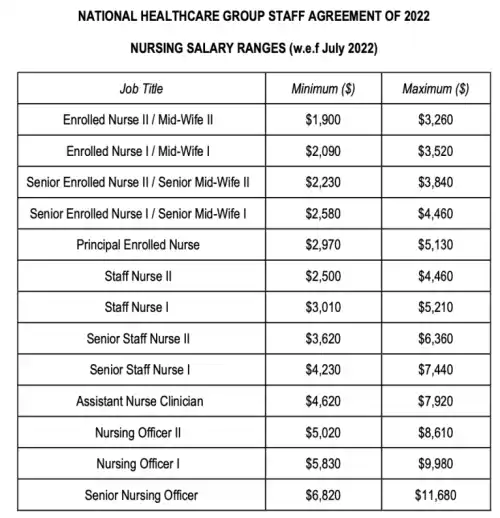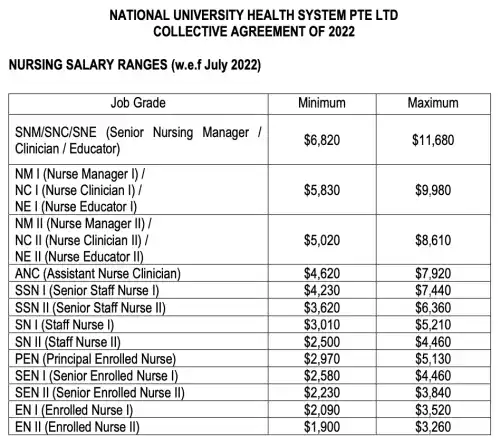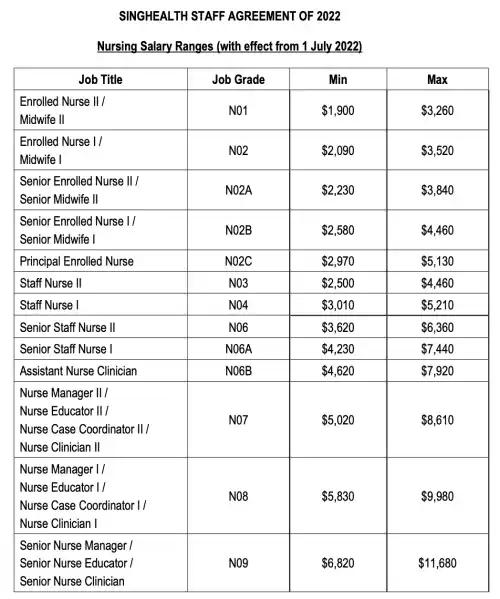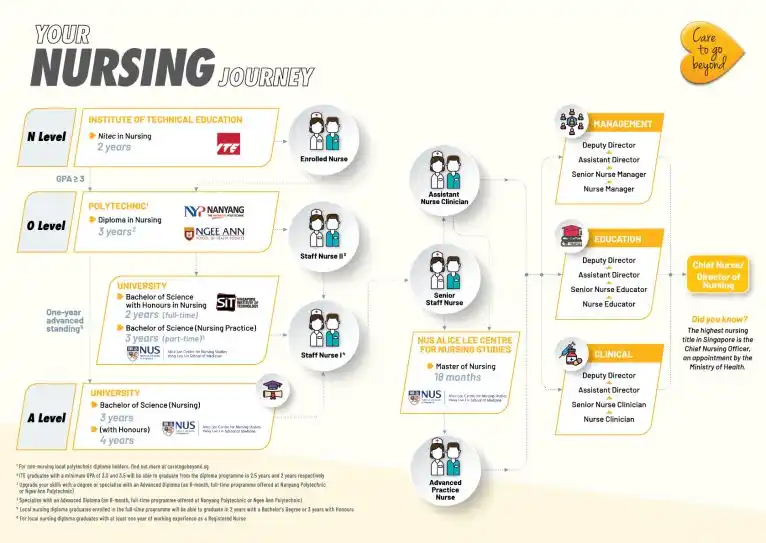Salary of nurses varies by entry qualifications
To be a nurse in Singapore, one must be registered with the Singapore Nursing Board (SNB). There are two types of nurses registered under the SNB: Enrolled Nurses and Registered Nurses. According to the SNB, the entry qualifications are different for each type of nurse, and Enrolled Nurses should work under the professional supervision of Registered Nurses.
To be an Enrolled Nurse, you need to have a NITEC in Nursing (issued by the Institute of Technical Education), while to be a Registered Nurse, you need to have at least a Diploma in Nursing or Diploma in Health Sciences (Nursing). The starting salaries for Enrolled Nurses and Registered Nurses are commensurately different.

Salary of nurses varies due to allowances
Depending on where they are deployed, nurses may need to work rotating shifts and night shifts, especially in hospitals. Allowances such as night shift allowance and ward allowance can add up and significantly affect their eventual salary.
Additionally, if the Staff Nurse is placed on-call during off-duty days, they will receive an on-call allowance even when not activated for duty. If they are activated, they will be given Callback Compensation, in line with overtime pay.
Nurses are also eligible for overtime pay if they exceed the stipulated working hours. According to the Healthcare Services Employees’ Union (HSEU), the number of stipulated working hours (excluding meal breaks) are:
- 38 hours per week for permanent night shifts, or
- 40 hours per week, averaged over a 2 or 2-week roster for rotating shifts, or
- 42 hours per week for fixed hours with no varying shifts.
Salary of nurses is standardised across public healthcare
Nursing is a profession with strong union support. The HSEU diligently advocates for nursing salaries on behalf of nurses. According to the 2022 Collective Agreements (CAs), the salary for nurses is standardised across the three public healthcare integrated clusters: SingHealth, National Healthcare Group (NHG) and National University Health System.



Enrolled Nurses start with a base salary of $1,900 and progress up to become Principal Enrolled Nurses who can earn $5,130. Staff Nurses start at $2,500 for polytechnic graduates and $3,010 for university graduates and progress to up to $7,440 for Senior Staff Nurse I. Further progression to Assistant Nurse Clinician and above will typically require additional qualifications, as nursing is a highly competency-based career.
This is the basic salary of nurses, not including allowances. Nurses who do shift work in hospital wards are likely to earn more from shift allowances. Allowances and benefits accorded to nurses are also spelt out in the HSEU CAs.
Salary of nurses increases with post-registration education
As seen from the collective agreements, a nursing career follows a fairly defined progression. Registered Nurses start as Staff Nurses and progress upwards via the Clinician, Educator or Manager tracks.
Enrolled Nurses can progress to Registered Nurses by taking diploma qualifications while diploma-qualified Registered Nurses can upgrade themselves with post-registration degree programmes. Staff Nurses also frequently take on Specialist or Advanced diplomas to improve their specialist skills. This would enable them to progress in their careers and be commensurately rewarded.
While the Ministry of Health (MOH) does not fund all nursing studies, several hospitals and healthcare institutions do provide scholarships and sponsorship opportunities to aspiring nurses and nurses who wish to upgrade themselves.

Special payments for nursing
Nurses are also rewarded to stay in nursing in public healthcare. According to the CARE (Career development, Autonomy, Recognition, and Education) package from the Ministry of Health (MOH), public healthcare nurses receive a Nurse Special Payment (NSP) of 0.5 months of their salary every December, on top of annual bonuses and allowances.
In March 2025, Singapore’s Ministry of Health (MOH) announced that 26,000 public healthcare nurses will benefit from adjustments of up to 4% to their monthly base salaries, to keep pace with market trends. These adjustments are on top of the recent introduction of the Award for Nurses’ Grace, Excellence and Loyalty (ANGEL) scheme in September 2024, which was launched to attract and encourage nurses to build a lifelong career in nursing.
According to a press release by MOH, this increase is part of ensuring that local healthcare staff “continue to receive annual salary increments, which aim to keep salaries in pace with inflation”.
“With these salary increases, which are over and above the annual increments, this will enable the public healthcare sector to better attract and retain staff.”
There are also plans to continue to review MOH’s manpower development initiatives, and improve opportunities for healthcare workers though job redesign and career development.
How different is the salary of nurses in private healthcare?
While it is often assumed that the salaries of nurses in private healthcare would be higher, this may not always be true. The job vacancies for private nurses on the MyCareersFuture jobs portal show that the salary ranges quoted are comparable to those of the public healthcare sector. However, the actual salary offered could differ based on one’s qualifications, working hours and so on.

Nursing as a profession is more than just about the salary
Going through the Covid-19 pandemic together as a nation and remaining on heightened alert for future pandemics has spotlighted the importance of healthcare workers in our daily lives. Nursing can be a demanding, but rewarding and noble profession. Our nurses have stood bravely and calmly in tough times, and Singapore’s healthcare system remains robust thanks to these essential workers. Interested in career in public healthcare as a nurse? Check out our salary guide 2025 for healthcare worker here now.
This article is contributed by DollarsAndSense.















